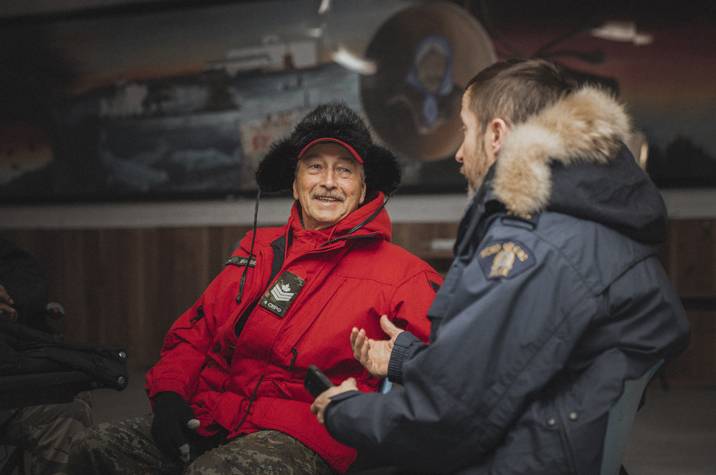Listening to Elders and Knowledge Keepers essential to reconciliation
By Paul Northcott

RCMP officers in northern Manitoba meet with Chiefs and Indigenous leaders, and attend cultural events and traditional ceremonies, to better understand reconciliation.
Image by Andrew Marshall, RCMP
January 25, 2024
Content
As the sound of a beating drum and singing punctuated the air on a frigid December afternoon in northern Manitoba, nine people sat together in a circle inside a small dome-shaped tent made of willow saplings and covered in heavy tarps.
Cree Elder Mervin McKay, his two helpers, and a small group of RCMP officers and employees did not feel cold inside despite the temperature outside registering well below -30 degrees Celsius.
As part of this traditional Sweat Lodge ceremony, participants entered the tent on their hands and knees to sit around a pit of hot stones resting on the ground in a hole cut out in the wood floor. Once the lodge's door was sealed, McKay regularly sprayed water on the rocks to generate steam and heat pushing temperatures higher, amidst drumming and singing. He and others occasionally sprinkled them with sage and sweetgrass.
Sharing stories
As the aroma filled the air, McKay began to talk about the history of his People. He explained that the number of saplings that make up the lodge represents the stages of life, and that the event represents an opportunity for those present to cleanse themselves. The group listened, and expressed gratitude for the opportunity to join and reflect on what they hoped to learn from the experience.
This centuries-old First Nations practice was banned in Canada from 1925 until 1951, when the Indian Act was changed. Sweat Lodge Ceremonies are meant to help participants connect with nature and its Creator and welcome harmony into their life. "The Sweat Lodge represents the womb of Mother Earth," explains McKay, who hosts Sweats on his property near the town centre of Thompson, Manitoba.
Listening and learning
For RCMP Superintendent Ryan Mitchell, the former officer in charge of Manitoba's North District, this Sweat was one of many he's participated in since working in the region for a year and a half. "My intent was to connect with my detachment commanders, Grand Chiefs, Chiefs, Elders and Knowledge Keepers to listen and learn from those with experience."
In northern Manitoba, officers now regularly meet with Chiefs and Indigenous leaders, complete First Nations awareness training, and attend youth activities, community festivals, cultural events and traditional ceremonies such as Sweats, Powwows, and Smudges.
Mitchell says that while operational duties are the main focus, it's his hope that when time permits, officers engage in reconciliation efforts with the communities they serve.
McKay sees efforts by RCMP officers like Mitchell as just one way to develop and maintain respect between Indigenous Peoples in Canada and non-Indigenous Canadians. "If you don't know our ways, how will you understand reconciliation?" McKay asks.
Mitchell's involvement in the community, which also includes supporting Indigenous-led Canadian Ranger patrols in Tadoule Lake and Shamattawa, resonates with Elder McKay. "I'm seeing something in him," says McKay. "He's interested in learning."
Healing the heart, mind, and body
Smudging is another tradition that Mitchell has experienced through his connection to local First Nations people. A Smudge Ceremony involves burning medicinal plants, such as sage, sweetgrass and cedar, so participants can cleanse themselves of negative feelings and connect with their Creator. During a ceremony, each person passes the smouldering bundles over their eyes, ears, mouth, and chest to help open the mind, heart, and body.
Elder Jack Robinson, who facilitates Smudging Ceremonies in the community, knows Mitchell well. The two men have participated in Smudges together on a number of occasions. Robinson says the ceremonies are an opportunity for him to talk about Indigenous values and culture, and share his own experiences growing up Cree, going through residential schools, living with addiction and recovery, and his hopes for the future.
During a recent Smudge at Thompson's Ma-Mow-We-Tak Friendship Centre, Robinson told a story that brought back painful memories of his People's past. At the event, adults silenced a group of children as Robinson spoke. "I said: 'No, leave them alone'," recalled Robinson. "At one time, our communities fell silent because our children were taken away and there was no noise. It was horrible and sad."
Robinson, McKay and Mitchell all agree that advancing reconciliation with Indigenous Peoples across Canada means participating in cultural activities and hearing these personal stories. "We have a privileged platform here to listen to Indigenous Peoples," he says. "Officers need to be involved… so we can build toward something better together."